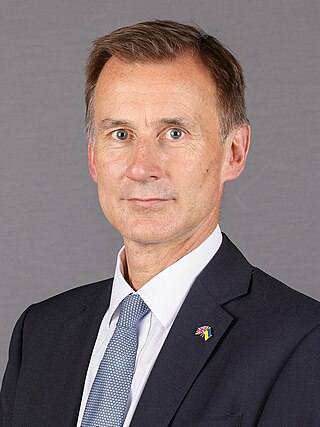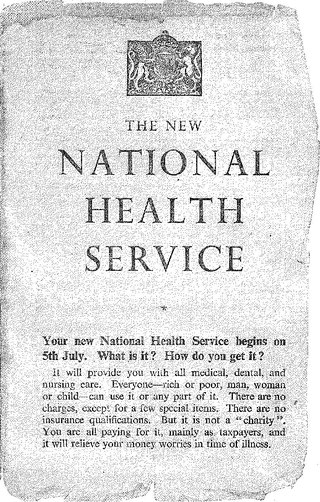The private finance initiative (PFI) was a United Kingdom government procurement policy aimed at creating "public–private partnerships" (PPPs) where private firms are contracted to complete and manage public projects. Initially launched in 1992 by Prime Minister John Major, and expanded considerably by the Blair government, PFI is part of the wider programme of privatisation and financialisation, and presented as a means for increasing accountability and efficiency for public spending.

The National Institute for Health and Care Excellence (NICE) is an executive non-departmental public body, in England, of the Department of Health and Social Care, that publishes guidelines in four areas:

Evelina London Children's Hospital is a specialist NHS hospital in London. It is administratively a part of Guy's and St Thomas' NHS Foundation Trust and provides teaching hospital facilities for London South Bank University and King's College London School of Medicine. Formerly housed at Guy's Hospital in Southwark, it moved to a new building alongside St Thomas' Hospital in Lambeth on 31 October 2005.

Jeremy Richard Streynsham Hunt is a British politician serving as Chancellor of the Exchequer since 2022. He previously served in the Cabinet as Secretary of State for Culture, Olympics, Media and Sport from 2010 to 2012, Secretary of State for Health and Social Care from 2012 to 2018 and Foreign Secretary from 2018 to 2019. A member of the Conservative Party, he has been Member of Parliament (MP) for South West Surrey since 2005.

The William Harvey Hospital is a hospital in Willesborough, Ashford, Kent, England. It is one of the three main hospitals in the East Kent Hospitals University NHS Foundation Trust area and is named after William Harvey (1578–1657), the Folkestone-born doctor who discovered the blood circulatory system.

The Norfolk and Norwich University Hospital (NNUH) is a large National Health Service academic teaching hospital in the Norwich Research Park on the western outskirts of Norwich, England.

Primary care trusts (PCTs) were part of the National Health Service in England from 2001 to 2013. PCTs were largely administrative bodies, responsible for commissioning primary, community and secondary health services from providers. Until 31 May 2011, they also provided community health services directly. Collectively PCTs were responsible for spending around 80 per cent of the total NHS budget. Primary care trusts were abolished on 31 March 2013 as part of the Health and Social Care Act 2012, with their work taken over by clinical commissioning groups.

NHS Scotland, sometimes styled NHSScotland, is the publicly–funded healthcare system in Scotland and one of the four systems that make up the National Health Service in the United Kingdom. It operates 14 territorial NHS boards across Scotland, supported by seven special non-geographic health boards, and Public Health Scotland.
A cost overrun, also known as a cost increase or budget overrun, involves unexpected incurred costs. When these costs are in excess of budgeted amounts due to a value engineering underestimation of the actual cost during budgeting, they are known by these terms.

Healthcare in the United Kingdom is a devolved matter, with England, Northern Ireland, Scotland and Wales each having their own systems of publicly funded healthcare, funded by and accountable to separate governments and parliaments, together with smaller private sector and voluntary provision. As a result of each country having different policies and priorities, a variety of differences have developed between these systems since devolution.

The National Health Service (NHS) is the publicly funded healthcare system in England, and one of the four National Health Service systems in the United Kingdom. It is the second largest single-payer healthcare system in the world after the Brazilian Sistema Único de Saúde. Primarily funded by the government from general taxation, and overseen by the Department of Health and Social Care, the NHS provides healthcare to all legal English residents and residents from other regions of the UK, with most services free at the point of use for most people. The NHS also conducts research through the National Institute for Health and Care Research (NIHR).

The National Health Service (NHS) is the umbrella term for the publicly funded healthcare systems of the United Kingdom, comprising the National Health Service in England, NHS Scotland and NHS Wales. Health and Social Care in Northern Ireland was created separately and is often locally referred to as "the NHS". The original three systems were established in 1948 as part of major social reforms following the Second World War. The founding principles were that services should be comprehensive, universal and free at the point of delivery—a health service based on clinical need, not ability to pay. Each service provides a comprehensive range of health services, provided without charge for people ordinarily resident in the United Kingdom apart from dental treatment and optical care. In England, NHS patients have to pay prescription charges; some, such as those aged over 60, or those on certain state benefits, are exempt.

The National Health Service in England was created by the National Health Service Act 1946. Responsibility for the NHS in Wales was passed to the Secretary of State for Wales in 1969, leaving the Secretary of State for Social Services responsible for the NHS in England by itself.

The East Midlands Ambulance Service NHS Trust (EMAS) provides emergency medical services, urgent care and patient transport services for the 4.8 million people within the East Midlands region of the UK - covering Nottinghamshire, Derbyshire, Leicestershire, Rutland, Lincolnshire and Northamptonshire. It was formed in 1999 by amalgamating several county ambulance services, and in July 2006 was dissolved and reformed under the same name as part of a nationwide reorganisation of ambulance service provision.

Poole Hospital is an acute general hospital in Poole, Dorset, England. Built in 1907, it has expanded from a basic 14-bed facility into a 789-bed hospital. It is the trauma centre for east Dorset and provides specialist services such as cancer treatment for the entire county. It is managed by the University Hospitals Dorset NHS Foundation Trust. The hospital was managed by Poole Hospital NHS Foundation Trust until the merger with The Royal Bournemouth and Christchurch Hospitals NHS Foundation Trust on 1 October 2020.
The Five Year Forward View was produced by NHS England in October 2014 under the leadership of Simon Stevens as a planning document.
The "Greater Manchester Model" of NHS health care was a system uniquely devolved within England, by way of close integration with the Greater Manchester Combined Authority and local authorities, led by the Mayor of Greater Manchester. In July 2022 the Greater Manchester integrated care system took over responsibility for health and social care in the conurbation. The financial plan for 2022–23 had an initial shortage of £187 million.
Professor Lord Darzi's review of the NHS in 2008 introduced the idea of personal health budgets (PHBs) in the English National Health Service. Since October 2014 people eligible for NHS Continuing Healthcare were given the legal right to have a personal health budget. NHS England’s Five Year Forward View called for a ‘major expansion’ of the scheme. NHS Choices describes personal health budgets as a way "to give people with long-term conditions and disabilities greater choice and control over the healthcare and support they receive."
The private provision of NHS services has been considered a controversial topic since the early 1990s. Keep Our NHS Public, NHS Support Federation and other groups have campaigned against the threat of privatisation, largely in England.

The March 2021 United Kingdom budget, officially known as Protecting the Jobs and Livelihoods of the British People was a budget delivered by Rishi Sunak, the Chancellor of the Exchequer in March 2021. It was expected to be delivered in autumn 2020, but was postponed because of the COVID-19 pandemic. It succeeds the budget held in March 2020, and the summer statement and Winter Economy Plan held in summer and autumn 2020, respectively. The budget is the second under Boris Johnson's government, also the second to be delivered by Sunak and the second since Britain's withdrawal from the European Union. The budget was the first for government expenditure in the United Kingdom to exceed £1 trillion.













